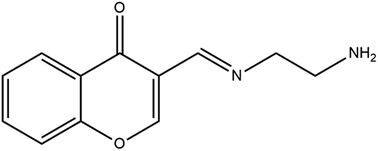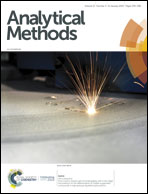Enhanced performance of organic nanoparticles of a Schiff base for voltammetric sensor of Cu(ii) ions in aqueous samples
Abstract
Organic nanoparticles of (E)-3-((2-aminoethylimino)methyl)-4H-chromen-4-one (IFE) were synthesized in aqueous dispersion by the reprecipitation method with an average particle size of 50–65 nm. They were characterized by dynamic light scattering (DLS) and transmission electron microscopy (TEM). Based on voltammetric measurements, organic nanoparticles of IFE exhibit good response towards sensing and selective detection of Cu(II) ions in aqueous medium. Under optimum conditions, the sensor shows excellent response to Cu(II) even in the presence of other alkali, alkaline earth, and transition metal ions. Differential pulse voltammetry was applied to characterize the optimized electrode and a linear dynamic range from 2.5 × 10−6 to 1.4 × 10−5 mol L−1 with a detection limit of 8.22 × 10−8 mol L−1 was obtained. This system has also been applied as a voltammetric sensor for the determination of Cu(II) ions in various real-life samples.



 Please wait while we load your content...
Please wait while we load your content...